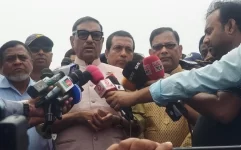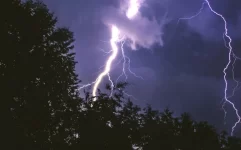Why is Dhaka’s dust pollution still out of control?
Dhaka has one of the worst air quality situations in the world, alongside Delhi and Lahore
As winter approaches, the air of Dhaka city is once again heavy with dust pollution. The capital faces the same situation every year, but there are still no visible signs that the recurring problem will be solved.
Dhaka scored 196 on the Real-time Air Quality Index (AQI) measured at the US Embassy in Dhaka at 8pm on Monday, which is categorized as unhealthy. Such a high score means the pollution will have some effect or the other on everyone’s health, and consequences for sensitive groups may be severe.
During the dry season, Dhaka gathers thick layers of dust. However, the dust levels can be kept at tolerable levels with proper initiatives.
The authorities claim the pollution is the result of ongoing development and construction work throughout the city, such as the Metro Rail Project and Elevated Expressway Project.
Surprisingly, there is no government authority in the country which is designated or liable to control dust and air pollution in Dhaka and elsewhere in Bangladesh. Consequently, no government body has a plan to tackle the dust pollution in the dry season.
The authorities only made a move on Monday by holding a virtual meeting among different organizations, after the High Court ordered prompt steps to implement its nine-point directives to bring down air pollution levels in Dhaka and its adjacent areas within 30 days.
The court order also included setting up barricades at all development and renovation projects in Dhaka city, spraying water twice in areas where development works are going on, transporting construction materials and garbage in covered vehicles, and forming a high-level committee led by the environment secretary to formulate a guideline.
It is not new for Dhaka to top the list of the worst polluted cities in the world in the Air Quality Indexes measured by several organizations. It attained top place many times in recent years.
Most recently, IQAir Air Visual ranked Dhaka as the city with the worst air pollution with an Air Quality Index (AQI) score of 188, followed by Pakistan’s Lahore and India’s Delhi, with an AQI score of 178 and 176 respectively, on October 18.
The current year saw Dhaka in the same position on January 31, February 6, 9, and 25, March 4, 7 and 27, April 25 and so on and so forth. It was among the top ten worst cities many times over as well.
Architect Iqbal Habib, joint secretary of Bangladesh Paribesh Andolon (BaPA), said: “Dhaka’s air turned most unhealthy in the winter due to the negligence of the authorities concerned. It is possible to control air and dust pollution in Dhaka if the authorities concerned become active.”
There are three important issues to ensure comfortable air in Dhaka. Firstly, stocking, supplying, and transportation of construction materials and waste must be covered at all costs.
Secondly, all illegal and unplanned brickfields, as well as incineration industries surrounding Dhaka, must be closed immediately.
Finally, necessary instruments should be used for spraying water on roads and roadside trees.
Coordination meeting held
Selim Reza, chief executive officer (CEO) of Dhaka North City Corporation (DNCC), said: “We had a coordination meeting with representatives of all the agencies concerned, such as Department of Environment [DoE], Dhaka South City Corporation [DSCC], Bangladesh Road Transport Authority [BRTA], Department of Roads and Highways, Dhaka DC office, Dhaka Metropolitan Police [DMP], who are committed to jointly work to control dust pollution.”
“We have decided that along with the agencies of city corporations such as the metro rail authority, the BRTA will also spray the roads by hiring vehicles. All the appropriate agencies will operate mobile courts against those responsible for dust pollution,” said Selim Reza.
“DNCC has 10 vehicles capable of spraying water on the roads and are already functional as well as operation of mobile court is ongoing. If the other agencies put in minimum efforts, it is possible to reduce dust in Dhaka,” he added.
Habibun Nahar, deputy minister of the Ministry of Environment, Forest, and Climate Change, said: “We have taken several steps, including operating mobile courts, and awareness-building campaigns, to control air pollution and dust. Hopefully, we will get comfortable air soon.”














